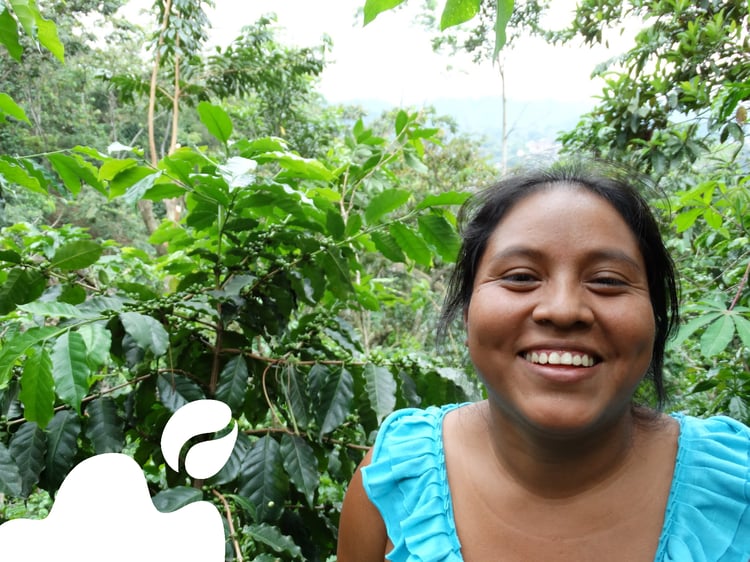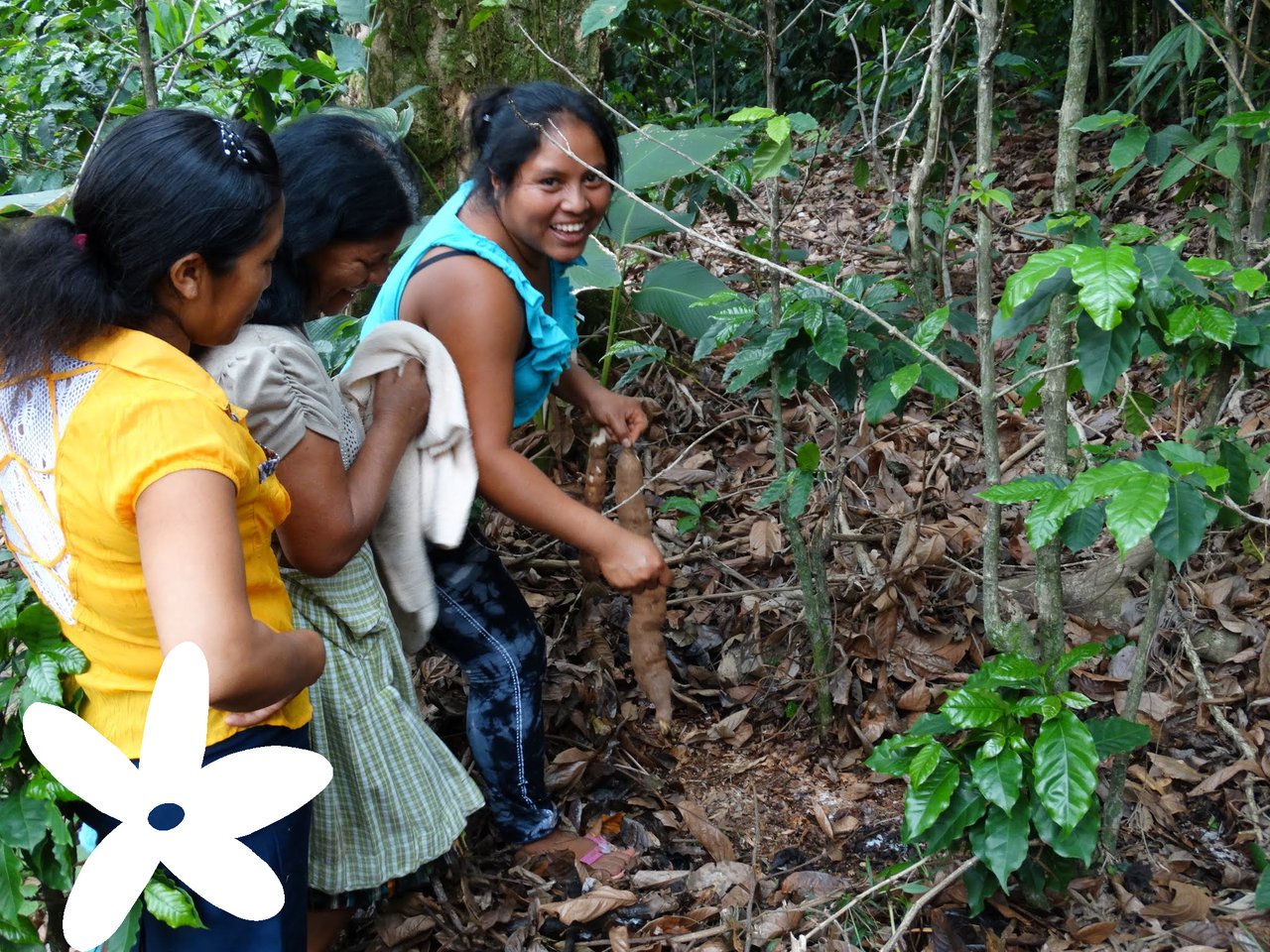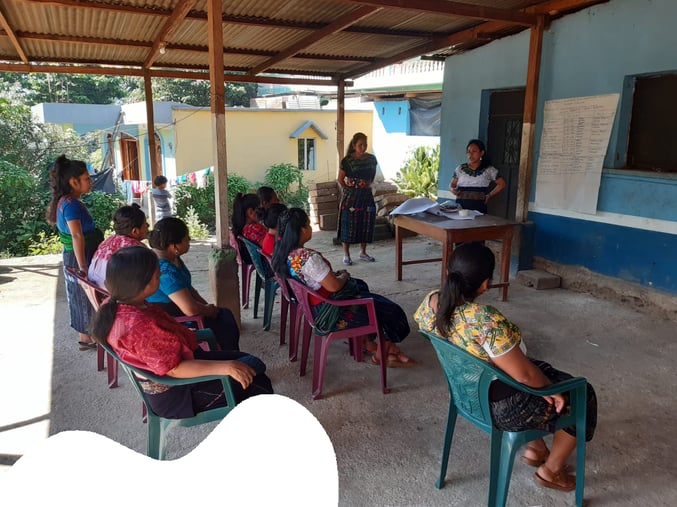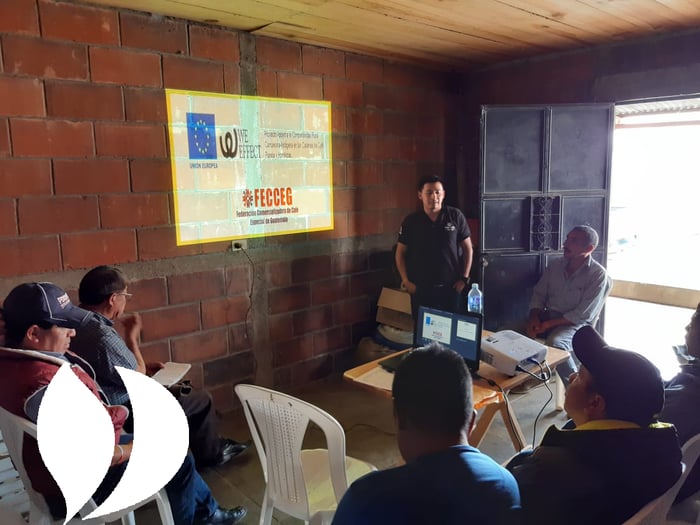
Coffee has been vital to Guatemala's economy since the first coffee plants arrived in the country in the mid-1700s. According to Guatemalan Coffees, coffee is the primary source of income for more than 125,000 families in this beautiful Central American country. Guatemala is known worldwide for its excellent-quality coffees and their great range of flavors, courtesy of the country’s fantastic geography, which results in an ideal environment for coffee to grow. The nation is also known for the great practices implemented by its coffee growers year after year, and Guatemala has worked hard to impact the lives of these coffee growers and their families in many ways.
To learn more about Guatemalan coffee and its impact on the farmers who grow it, we talked to Doris Quijivix, our supply manager and coordinator in Guatemala, Felix Camposeco, manager at the ACODIHUE cooperative, Juan Francisco Gonzalez, manager at the co-op FECCEG, along with Gino Roverssi and Peter Engelhardt, part of the quality control team at Dinamica Coffee. These coffee pros talked to us about the work they do around the inclusion of women producers, young coffee professionals, and small farmers and how it has helped strengthen the industry there. We’re excited to share their insights with you here!
________________________________________________
Working closely with women producers
It's not uncommon to find Guatemalan coffee farms abandoned after their owners have migrated to cities or other countries to look for better opportunities. You will also find farms run by widows, or wives of men who left their homeland in search of better opportunities. Juan Francisco of FECCEG explains that often these are young women who are raising their children by themselves, while trying to maintain their coffee production, which is their main source of income.
Juan Francisco and FECCEG work closely with women producers to help improve the quality of their coffees; this year, FECCEG achieved their first organic certification for women-produced coffee, something that Juan Francisco explains “feels like a way to recognize the hard work of these women; it shows the commitment to their families and their community.”
Similar to what Juan Francisco and FECCEG do, our partners at ACODIHUE work closely with around 700 women producers. Felix explains that ACODIHUE has been developing programs for years to help women build and strengthen their skills around the economic development and administration of their farms so they can be seen as leaders and decision-makers. Felix says, “We've seen women completely transform. After working with them for a while, you see them standing with confidence and talking in front of a group of men, without any doubts, demonstrating they know what they are talking about.”

ACODIHUE is not only giving women producers the tools to manage their farms better, they are also helping them become more confident in their personal lives. An example of this is a program ACODIHUE created with the goal of “changing the smiles of small women producers”; after realizing many of its women producers had damaged teeth or had lost some of their teeth due to calcium deficiency, ACODIHUE provided them with dental health plans and/or implants. Felix mentions this has helped change the attitudes of many of the women they work with. “You now see them taking selfies and smiling more than they did before,” he says. “Some didn't even used to talk much, as they were ashamed of their smiles. Seeing them happy warms our hearts.”
Asproguate, another of our partners in Guatemala, has conducted its own efforts with women farmers, working closely with women producers from the regions of San Martin Jilotepeque and Atitlan and two villages in the municipality of San Juan la Laguna. In 2019, they created the Fuerza de Mujer group and a project to strengthen women's business development.
In addition to their work as coffee growers, the women who work with Asproguate on this project are also textile makers, weaving fabrics and patterns traditional to the region, which they sell to maintain their coffee plantations and provide additional income for their families. One of the program's main goals is to empower women with training in leadership, finance, health, and nutrition and the organic and environmental training programs offered by Asproguate.
Even though our partners have seen remarkable improvements in the lives of women producers, it is still a long-term project to get some of the older male farmers to accept women with leadership roles in coffee production. “We often hear stories of men [passing down the] farms to their sons, just because they are men, but thankfully, we're slowly seeing that change,” Felix says. “We are now seeing women taking care of their lands, and doing an incredible job!"
Juan Francisco agrees, saying that FECCEG has seen some great changes in its producing communities led by women—in his view, women often know what is needed in their areas. “They find ways to increase the quality of life in their communities, they are committed to them, they find solutions to their problems,” he says. “If they need a new school or a new bridge, they are taking charge to help start these projects.”
Supporting a new generation
The generational dynamic is important to the future of coffee—not just in Guatemala, but in coffee-producing areas around the world. Helping male producers in the older generation see that women are essential to coffee’s growth in the future is just one element. Additionally, helping the younger generation of farmers receive support and grow is also important to coffee’s future.
As mentioned previously, it's not uncommon to see coffee growers in Guatemala leaving their farms for bigger cities or for opportunities in other countries. For our partners in Guatemala, it has been crucial to show the younger generation in coffee that the industry has a lot to offer, in turn helping to protect the future of Guatemalan coffee. Our partners aim to show young coffee professionals that “being in coffee” doesn't just mean taking care of a plot of land, selling the coffee, and waiting until the next harvest season. It is a year-round career that requires investment, and that can pay off in untold opportunities.
To introduce the mindset of promise around coffee to young people, Felix says the first step for ACODIHUE has been to work with their parents, “convincing older generations about them not living forever and making clear that they need to pass all their knowledge on to their children,” he says. Felix explains that this process “has been tough, but it's something that needs to be done for the new generation of coffee producers to understand coffee and to fall in love with it.”

ACODIHUE has developed programs to show children of older generations of producers that there's more to coffee than what they’ve probably seen. Among the co-op’s approaches include teaching these young coffee pros how to cup coffee and giving them networking opportunities with people their age who share similar interests. ACODIHUE also takes these young people to coffee events and expos, where they can see what coffee has to offer and how it can be more profitable. Additionally, they have brought in young baristas and roasters from Guatemala City to lead workshops with the young coffee pros, teaching them about roasting and coffee brewing. These workshops show the young people different ways to work with coffee, and aim to illuminate them about the important role young coffee professionals will play in the future of coffee production.
As a result of these programs, ACODIHUE is now working with more than 100 young coffee workers who are on their way to becoming professional cuppers and baristas. They are also leading a course on “tourism and coffee” with around 30 young people, helping them diversify the income of their families by providing tours and farm visits to coffee buyers and people interested in learning more about where coffee comes from, as well as how to open coffee shops in their towns to increase tourism.

Access to information
Our partner organizations in Guatemala work with many producers who grow coffee on small pieces of land, which often entails investing time and effort to help them improve their practices. Peter from Dinamica Coffee says they view working with small producers as “a way to change the perception they have about coffee.” These consultations help these producers stop viewing the sale of their coffee as a mere transaction: “You see how now they want to really develop long-term relationships with buyers, and how they start to understand the responsibility they have as farmers to deliver quality,” Peter says. “It's amazing to see them want to improve their coffee and to see them more committed to their work.”
Felix says that at ACODIHUE, they see the work of nurturing smaller producers as a way to contribute to the future of the Guatemalan coffee industry. "I’d like for people to think of Guatemalan coffee as high-quality coffee, but I’d like to hear people saying that Guatemalan coffee means development, consistency, hard work, and dedication, and this is why we work towards that,” Felix says.
%20copy.png?width=700&name=WhatsApp%20Image%202020-09-22%20at%2016.31.29%20(1)%20copy.png)
ACODIHUE works closely with small producers by providing them with training around quality control, organic practices, the implementation of better agricultural practices, and crop management. When needed, the co-op also supports communities through the construction of infrastructure such as drying patios. ACODIHUE also provides technical assistance to small producers, adapted to the needs of each grower and their farm; the co-op conducts follow-up visits year-round, which Felix thinks help farmers develop some sense of responsibility, not only to their communities, but also to the environment and their product.
In addition to providing training and technical assistance at the farm level, our partners involve producers in the quality control process by inviting them to be part of cuppings and having them taste their coffee and understand its flavors. Juan Francisco at FECCEG says he thinks this “motivates producers, as they get to taste the results of all their hard work." In addition, he says the cupping process makes farmers want to increase their quality even more, as they feel an increasing amount of pride in their coffee.
________________________________________________
The hard work of our partners in Guatemala to include women producers, young growers, and small farmers does not go unnoticed; we enjoy tasting the results of their coffees year after year—and especially being able to share them with you! This year's Guats are just arriving, and we can't wait for you to try them so ask for our spot offerings and order some samples!



.png)
